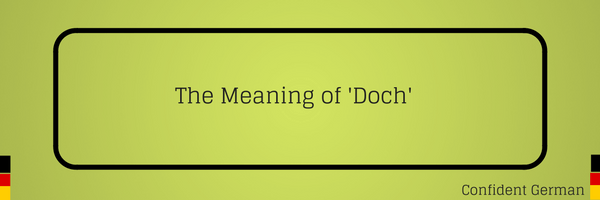
The Meaning Of the Word ‘Doch’
Doch is a word many German learners are struggling with, it has not one but countless translations. Its meaning depends highly on the context the word is used in. In general it is used as a positive assertion. As the word is used quite frequently by native speakers, it is worth it for any German learner to get a feeling for the meaning of it.
This article aims to give you a basic overview and understanding of how the word is most frequently used. I will only explain the most common uses in this article. There are additional uses to doch, which you will discover when speaking to native speakers. Knowing these basic uses for doch will give you an idea of what the word could mean in those cases.
When looking at the English language the word “like” translates similarly bad as doch. There are countless ways to how you can translate the word as it is used differently depending on the context or phrasing.
-
Counter a negative statement
This is the most popular usage of doch. When someone makes any kind of negative statement about you.
Du bist nicht groß! – You are not tall.
Doch. – No, I am tall.
With doch you can counter a negative statement in one word. If you are to answer with only ““No” it would not completely be clear whether you agree or disagree with the statement.
Nein (ich bin nicht groß.) – No, I am not tall.
Nein ( ich bin groß.) – No I am tall.
Doch helps you to make clear that you disagree with the negative statement and the opposite is what is true.
Here is another example:
Example II
Du kannst das nicht. – You can not do it.
Doch! – “That’s not true, I can do it.“
2. In an argument – to oppose your opponent
You can use doch in an argument to express and affirm your position. As you see in the example below, doch helps you to argument more effectively. While you need dozens of words in English to counter a statement in German one word is enough.
Example
A:Du kommst immer zu spät. – You always come late.
B:Nein, ich komm nie zu spät. – No, I never come late.
A: Doch! – “No, you’re wrong, you always come late.”
B: Nein, du siehst mich nur nie – No, you just never see me.
A: Doch! – „I always see you, you always come late.”
3. Answering a negative question
Similarly to countering a negatively phrased statement, you can also counter a negative question.
Example
A: Du kommst morgen nicht oder? – You are not coming tomorrow, aren’t you?
B: Doch, ich komme – No, I am coming.
4. Further uses of doch
As previously mentioned doch has countless meanings, by giving you more examples of potential uses I want to give you a better feeling for the word.
Ich habe es probiert, doch es hat nicht funktioniert – I tried, but after all it didn’t work.
Here doch translates to but, it is used to emphasize the statement that after all it did not work despite the person training.
Du kannst das (doch) nicht sagen – You can really not say that.
Das ist (doch) super – That’s indeed awesome.
You can use doch to affirm and strengthen a statement you are making. Doch is not a necessary component in these sentences and could also be left out. The words really or indeed are used in a similar manner in English.
Es wurde doch spät. – It got late though.
In this example doch translates as though. It means that something happened against your expectation. In this example sentence you are communicating that you expected the event/dinner/game to end early, but it ended late.
Conclusion
Doch can be translated to English in countless ways, the reason is that there is no general word in English that is used as a positive assertion. When you are struggling with doch, my recommendation is to first let it be and keep on practising. With time you will get a feeling for the meaning of doch even though you won’t be able to directly translate it. Instead ask a native speaker for the meaning of doch in that specific context or how they would translate it.
